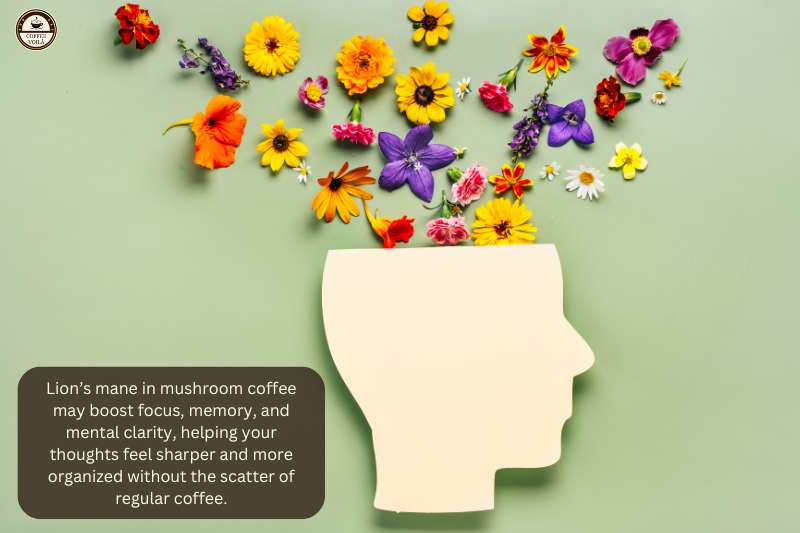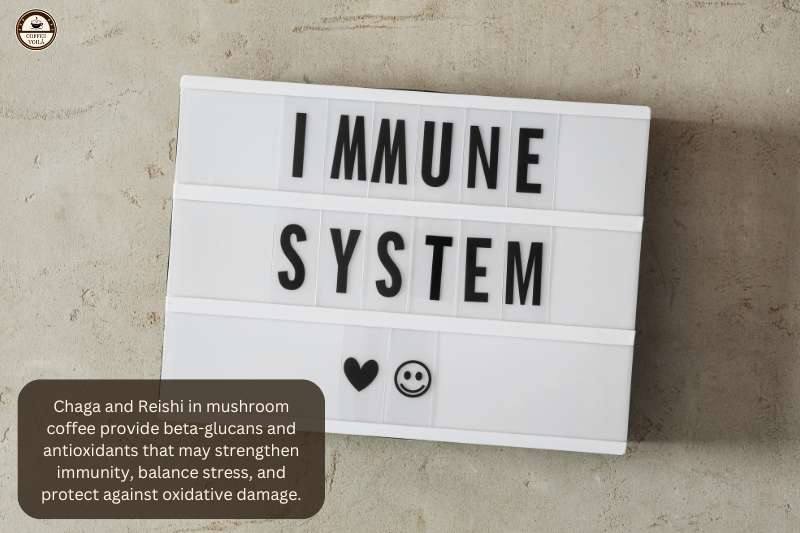5 Powerful Mushroom Coffee Benefits (Is it all hype?)
Last updated on September 9th, 2025 at 10:24 am
A few months ago, I wrote about my first experience with it in “Should You Give Mushroom Coffee a Try? (My Experience).”
At the time, I wasn’t sure what to expect. I figured it might just taste earthy and leave me missing my regular brew. But after a few days, I started noticing subtle changes: steadier energy, less of that jittery crash, and even better focus during long work sessions.
That’s the thing. Most people hear about its benefits and think it’s another wellness fad. However, there are some genuine reasons why it’s gaining popularity.
In this guide, you’ll discover the top 5 benefits of mushroom coffee, how they actually work, and what you can realistically expect if you give it a shot.
Top 5 Mushroom Coffee Benefits
Mushroom coffee comes with a long list of potential perks. But if you want the highlights, here are the top five benefits at a glance:
| Benefit | Quick Explanation | Why It Matters |
|---|---|---|
| 1 – Steadier Energy | Less caffeine than regular coffee + adaptogens like cordyceps and reishi help slow caffeine absorption. | Energy feels smoother, with fewer jitters and no afternoon crash. |
| 2 – Focus & Mental Clarity | Lion’s Mane mushroom is linked to brain health and cognitive performance. | Supports concentration, memory, and productivity for work or study. |
| 3 – Immune Support | Chaga and Reishi provide beta-glucans and antioxidants. | Helps strengthen the immune system and protect against oxidative stress. |
| 4 – Stress Regulation | Adaptogenic mushrooms (like reishi) help balance cortisol levels. | Promotes calm focus and reduces the effects of daily stress. |
| 5 – Gut & Digestive Health | Mushrooms like turkey tail contain prebiotics that feed good bacteria. | Supports a healthier gut microbiome and makes coffee easier on the stomach. |
1 – Steadier Energy (Less Jitters, Less Crash)
One of the biggest benefits of mushroom coffee is how steady the energy feels compared to regular coffee. Instead of a sharp caffeine spike followed by an inevitable crash, it delivers a smoother, more balanced boost.
That means less jittery hands, fewer racing thoughts, and no mid-afternoon slump that leaves you dragging.

The reason comes down to the mushrooms themselves. For instance, adaptogens like reishi and cordyceps don’t contain caffeine. However, they help regulate how your body responds to stress and energy demands.
In effect, they slow down the release and absorption of caffeine. So it feels less like a rollercoaster and more like an even climb.
Also, many blends contain about half the caffeine of a regular cup. That’s around 45–50 mg compared to 90+ in standard coffee. This makes mushroom coffee a great option if you’re sensitive to caffeine or want something gentler.
Notes: Of course, moderation still matters. If you drink three or four cups, you’ll feel it. But for a smoother, longer-lasting sense of alertness without the crash, mushroom coffee stands out.
2 – Boosts Focus and Mental Clarity
If there’s one mushroom that gets talked about the most in mushroom coffee, it’s lion’s mane. This weird-looking mushroom has been studied for its potential to support brain health and even stimulate nerve growth factors.
Usually, regular coffee gives you a jolt of energy. But it also leaves you scattered like your brain’s running five tabs at once with none of them loading properly.

However, when lion’s mane is blended into mushroom coffee, the effect feels steadier. In research, Lion’s mane has been linked to improved memory, focus, and cognitive performance.
For instance, people who use it often say it helps with creative work, long study sessions, or getting through a packed workday without that mental fog rolling in.
It doesn’t feel artificial either, more like your thoughts finally line up in order, instead of all fighting for attention at once.
If you’re curious, start with a mushroom coffee that specifically lists lion’s mane as one of the main ingredients.
Notes: For example, brands like Four Sigmatic or Ryze highlight this in their blends. I suggest trying it on a morning when you have a lot of brain-heavy tasks ahead. You might notice the difference between “getting through” your to-do list and actually enjoying how sharp your mind feels.
3 – Supports Immune Health
Chaga and Reishi are the real stars here, and they’ve been used for centuries in traditional Chinese and Ayurvedic medicine as immune boosters.
Nowadays, they’re popping up in mushroom coffee blends because of their beta-glucans and antioxidants. Your immune system loves these compounds.
For example, Chaga is often called the “king of mushrooms” because it’s loaded with polyphenols and other compounds that help the body fight oxidative stress.

Basically, these antioxidants act like tiny bodyguards against free radicals, which are unstable molecules that contribute to aging and chronic disease.
Some research even shows that Chaga extracts contain some of the highest antioxidant levels found in nature. That’s huge if you’re looking to give your body a little extra protection.
On the other hand, Reishi is more of the “calming protector.” It’s considered an adaptogen. This means it helps regulate how your body responds to stress.
But it has also been linked to supporting immune balance, helping your system not overreact (like with inflammation) while still staying strong against everyday threats.
Notes: Now, it’s worth noting that while mushrooms themselves have proven immune benefits. You still have limited research on whether mushroom coffee delivers those same results after processing and brewing.
Nevertheless, regularly drinking blends with Chaga and Reishi means you’re at least getting some of those beneficial compounds (brands like Four Sigmatic, Ryze, or MUD\WTR often include them in their formulas).
4 – Adaptogenic Stress Support
One of the things that pulled me toward mushroom coffee in the first place was the idea of adaptogens. I’d see that word plastered across bags of coffee blends and thought it was a marketing strategy.
But after digging deeper (and feeling a difference after a few weeks), I realized there’s something to it. The fact is adaptogens are compounds that help your body adapt to stress. In other words, they keep your system from overreacting when life gets chaotic.

Reishi mushroom, known as lingzhi, is the star of the show here. It has been used in Chinese and Ayurvedic medicine for centuries. And not only for immune support, but for calming the nervous system as well.
Plus, modern research suggests Reishi helps regulate cortisol. The stress hormone that spikes when you’re under pressure.
The truth is, when cortisol stays high day after day, it can lead to burnout, constant fatigue, and even sleep problems. With Reishi, instead of running on constant “fight-or-flight” mode, your body stays more balanced.
I won’t claim it’s magic. Some mornings, you may still feel frazzled, even after a cup. But compared to straight espresso shots, mushroom coffee feels gentler.
It delivers energy while keeping you grounded with a calm focus. That’s why so many blends pair Reishi with Lion’s Mane or Chaga. You get the brain boost and the stress support in a single cup.
Notes: Meanwhile, adaptogens aren’t instant fixes. They work best with consistent use, and results can vary. Still, if stress has you wired and tired, adding Reishi-rich mushroom coffee into your routine can help you out.
5 – Gut and Digestive Health
One thing I didn’t expect when I first tried mushroom coffee was how much gentler it felt on my stomach compared to regular coffee. It was never a huge problem for me. But sometimes a strong cup of black coffee can leave you feeling jittery or acidic.
However, blends with mushrooms like chaga or turkey tail are noticeably smoother. That’s because of the prebiotics inside certain mushrooms.

Basically, prebiotics are food for your gut’s “good bacteria.” By feeding them, you’re helping maintain a healthier gut microbiome. This supports digestion and even immune health.
For instance, mushrooms like lion’s mane and turkey tail contain fibers that encourage these bacteria to thrive. Over time, this balance can make coffee less irritating, especially if you’ve ever struggled with stomach upset from caffeine.
Now, research on the gut benefits of mushroom coffee is still limited. While we know mushrooms themselves can improve gut health. We don’t know if it has the same effect once blended into coffee.
Still, Harvard Health points out that mushrooms are naturally rich in vitamins, minerals, and antioxidants that may aid digestion and reduce inflammation.
Even if the benefits aren’t fully proven in coffee form, you’re still getting compounds that your gut recognizes and can put to use.
Notes: Mushroom coffee may not be a miracle cure for digestion. However, due to its prebiotic content, it can be a gentler, gut-supportive alternative to your standard cup of coffee.
Bonus: May Enhance Physical Performance
If you’ve ever wondered why some athletes are reaching for mushroom coffee before workouts, the answer is usually cordyceps mushrooms.
These fungi are famous for supporting oxygen use in the body. This can make a difference when it comes to stamina and endurance. Instead of relying solely on caffeine for a quick jolt, cordyceps work more like an endurance booster.

In other words, this helps your body use oxygen more efficiently. So you can go longer without hitting that dreaded wall.
I first noticed the hype when I read about cordyceps being used by runners and cyclists. At first, I thought it was another supplement trend.
Furthermore, cordyceps contain compounds that may increase VO₂ max (the maximum amount of oxygen your body can use during exercise).
When paired with the natural caffeine in mushroom coffee, it creates a pre-workout drink that gives you energy without making you feel jittery.
However, results aren’t the same for everyone, though. Some people notice better endurance and stamina, while others barely feel a difference. Like most functional mushrooms, cordyceps work best with consistent use rather than a single cup before training.
Notes: If you want to give it a try, drink mushroom coffee with cordyceps about 30–45 minutes before exercise. The combination may help you power through that extra set at the gym or run a little longer without hitting the wall.
Are There Any Downsides With Mushroom Coffee?
It comes with plenty of hype, but it’s not perfect. You sill have some cons to consider with mushroom coffee. For instance:
| Potential Downside | Details to Know |
|---|---|
| Not a miracle cure | While mushrooms contain adaptogens, antioxidants, and prebiotics, there’s very little human research proving mushroom coffee itself delivers all these benefits. Effects vary a lot from person to person. |
| Taste can be earthy | Most blends taste close to coffee, but some people notice a nutty, earthy flavor that takes getting used to. Many brands (like Ryze or MUD\WTR) blend cacao or spices to make it smoother. |
| Allergies & health conditions | If you’re allergic to mushrooms, or have kidney problems, digestive issues, or immune disorders, mushroom coffee may not be safe. For example, chaga is high in oxalates, which can increase kidney stone risk. |
| Medication interactions | Some mushrooms, such as reishi, can affect blood pressure, blood sugar, and clotting. This means they may interfere with meds like insulin, anticoagulants, or blood pressure drugs. Always check with a doctor first. |
| Label transparency | Many brands don’t disclose exact amounts of mushrooms in their blends. Without that info, it’s hard to know if you’re getting enough of the active compounds to actually see benefits. |
Notes: Mushroom coffee is generally safe for most people, but it isn’t risk-free. If you’ve got health conditions or take medications, it’s best to play it safe and talk with your doctor before divin
Last Thoughts
So, have you tried mushroom coffee yet? Did you notice a difference in your focus, energy, or digestion? Or do you think it’s simply an overpriced trend compared to regular coffee? I’d like you to hear your experience below, and with that… voilà!







